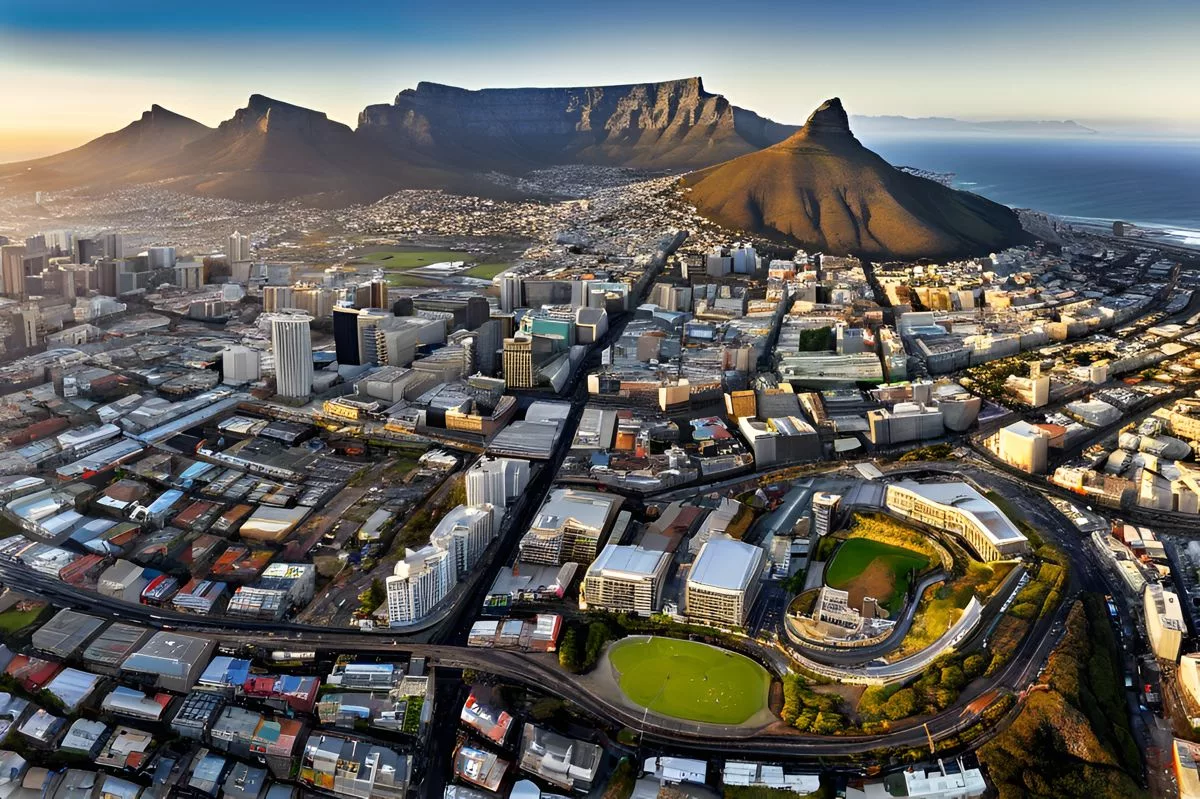Table Mountain is a table-shaped mountain in South Africa that stands above Cape Town. It is a symbol of the region’s cultural heritage and nature’s timeless allure. With approximately 350 hiking trails and roughly 160 kilometers of biking paths, it is an ideal destination for nature lovers, hikers, and cyclists. Table Mountain has earned a significant reputation in global tourism, having been recognized as Africa’s top tourist spot by the World Travel Awards for four consecutive years.
What is Table Mountain?
Table Mountain is an iconic mountain located above Cape Town in South Africa. This table-shaped mountain is a symbol of the region’s cultural heritage and nature’s timeless allure. It is recognized as Africa’s top tourist spot and was selected as one of the New7Wonders in 2012. With approximately 350 hiking trails and roughly 160 kilometers of biking paths, Table Mountain is an ideal destination for nature lovers, hikers, and cyclists.
Behold the Beauty of Cape Mountain
South Africa’s iconic table-shaped mountain, Table Mountain, stands proudly above Cape Town, a dynamic city full of life and culture. As the city’s most prominent landmark, it welcomes visitors as they arrive and leaves a lasting mark on them as they depart. With its breathtaking splendor and fascinating history, it’s no surprise that it was selected as one of the New7Wonders in 2012. This selection highlights the worldwide appreciation for this magnificent natural spectacle.
A Tourist Attraction with a Rich Heritage
Table Mountain has earned a significant reputation in global tourism, having been recognized as Africa’s top tourist spot by the World Travel Awards for four consecutive years (2019, 2020, 2021, and 2022). Its original name, ‘Hoerikwaggo’, translates to ‘Mountain in the Sea’ in the Khoisan tribal language, and this awe-inspiring mountain is a symbol of the region’s bountiful cultural heritage and nature’s timeless allure.
Stretching across an impressive expanse of roughly 25,000 hectares, this mountain, which is approximately 240 million years old, stands as one of the world’s oldest geographic structures. It dwarfs the comparatively youthful Alps which are only 40 million years old. This ancient giant was once four times taller than its current stature. Now, its highest peak, Maclear’s Beacon, towers 1,086 metres above sea level. This peak gets its name from the man who constructed a stone cairn there in 1865 for a trigonometric survey, adding a personal narrative to the mountain’s extensive history.
Geological Wonders and Biodiversity
With a geological makeup as varied as its wildlife, Table Mountain’s base consists of shale while Cape granite adorns its western facet. Its approximately 350 hiking trails and roughly 160 kilometers of biking paths render it an ideal destination for nature lovers, hikers, and cyclists.
The mountain is also home to the rock hyrax, or “dassie”, a mammal akin to a guinea pig. These creatures are the most frequently spotted animals on the mountain, contributing to the rich biodiversity of the area.
Constructed in 1929, the cableway is another remarkable feature of Table Mountain. Initially, it could ferry 25 passengers to the peak. However, modern enhancements now allow it to carry up to 70 people per ride, offering increasing numbers of visitors the opportunity to take in the stunning views from the mountain’s summit.
The Skyward Reach of Table Mountain
Table Mountain’s influence isn’t confined to terra firma. It’s also honored in the heavens with the ‘Mensa’ constellation, which translates to ‘table’ in Latin. It’s the only constellation named after a terrestrial feature and the only South African location to enjoy such a distinction.
The importance of the mountain intertwines with the history of Cape Town itself. Fresh spring water from Table Mountain served as a crucial resource for passing ships and was conveyed via canals, now concealed beneath the city’s roads. In fact, the city owes its location to Table Mountain’s Platteklip stream. Without this freshwater source, Cape Town would have been established at the safer natural harbor of Langebaan on the West Coast.
Romantic Charm of the Mountain
Intriguingly, Table Mountain does not just offer adventure and history; it also has a romantic allure. Over 80 couples have exchanged wedding vows against this stunning backdrop, immortalizing their special day in one of the globe’s most picturesque locations.
All these aspects create the multifaceted identity of Table Mountain. It isn’t merely a mountain; it’s an enduring witness to nature’s beauty and resilience, a beacon of cultural heritage, and a source of awe and adventure for a multitude of visitors each year. This makes it deserving of its recognition as one of the seven wonders of nature.
What is the significance of Table Mountain?
Table Mountain is an iconic mountain located above Cape Town in South Africa, recognized as Africa’s top tourist spot and selected as one of the New7Wonders in 2012. With its breathtaking splendor and fascinating history, it is a symbol of the region’s cultural heritage and nature’s timeless allure.
What is the geological makeup of Table Mountain?
Table Mountain’s base consists of shale while Cape granite adorns its western facet. Its approximately 350 hiking trails and roughly 160 kilometers of biking paths render it an ideal destination for nature lovers, hikers, and cyclists. The mountain is also home to the rock hyrax, or “dassie,” a mammal akin to a guinea pig, contributing to the rich biodiversity of the area.
What is the history of Table Mountain?
Table Mountain’s original name, ‘Hoerikwaggo’, translates to ‘Mountain in the Sea’ in the Khoisan tribal language. This awe-inspiring mountain is a symbol of the region’s bountiful cultural heritage and nature’s timeless allure. It stands as one of the world’s oldest geographic structures, approximately 240 million years old.
What is the cableway on Table Mountain?
Constructed in 1929, the cableway is another remarkable feature of Table Mountain. Initially, it could ferry 25 passengers to the peak. However, modern enhancements now allow it to carry up to 70 people per ride, offering increasing numbers of visitors the opportunity to take in the stunning views from the mountain’s summit.
What is the Mensa constellation?
Table Mountain’s influence isn’t confined to terra firma. It’s also honored in the heavens with the “Mensa” constellation, which translates to ‘table’ in Latin. It’s the only constellation named after a terrestrial feature and the only South African location to enjoy such a distinction.
What is the romantic charm of Table Mountain?
Over 80 couples have exchanged wedding vows against this stunning backdrop, immortalizing their special day in one of the globe’s most picturesque locations.










